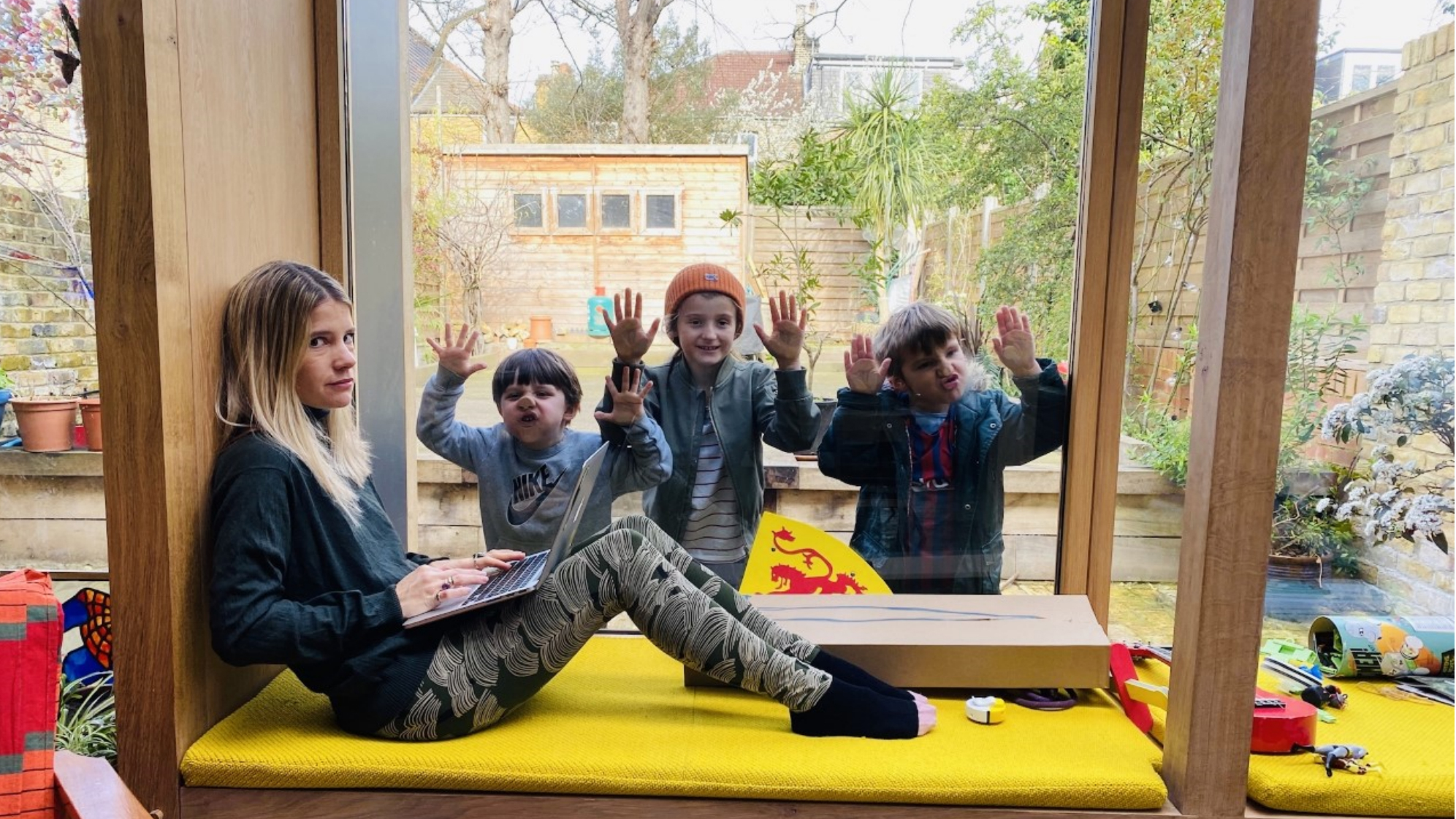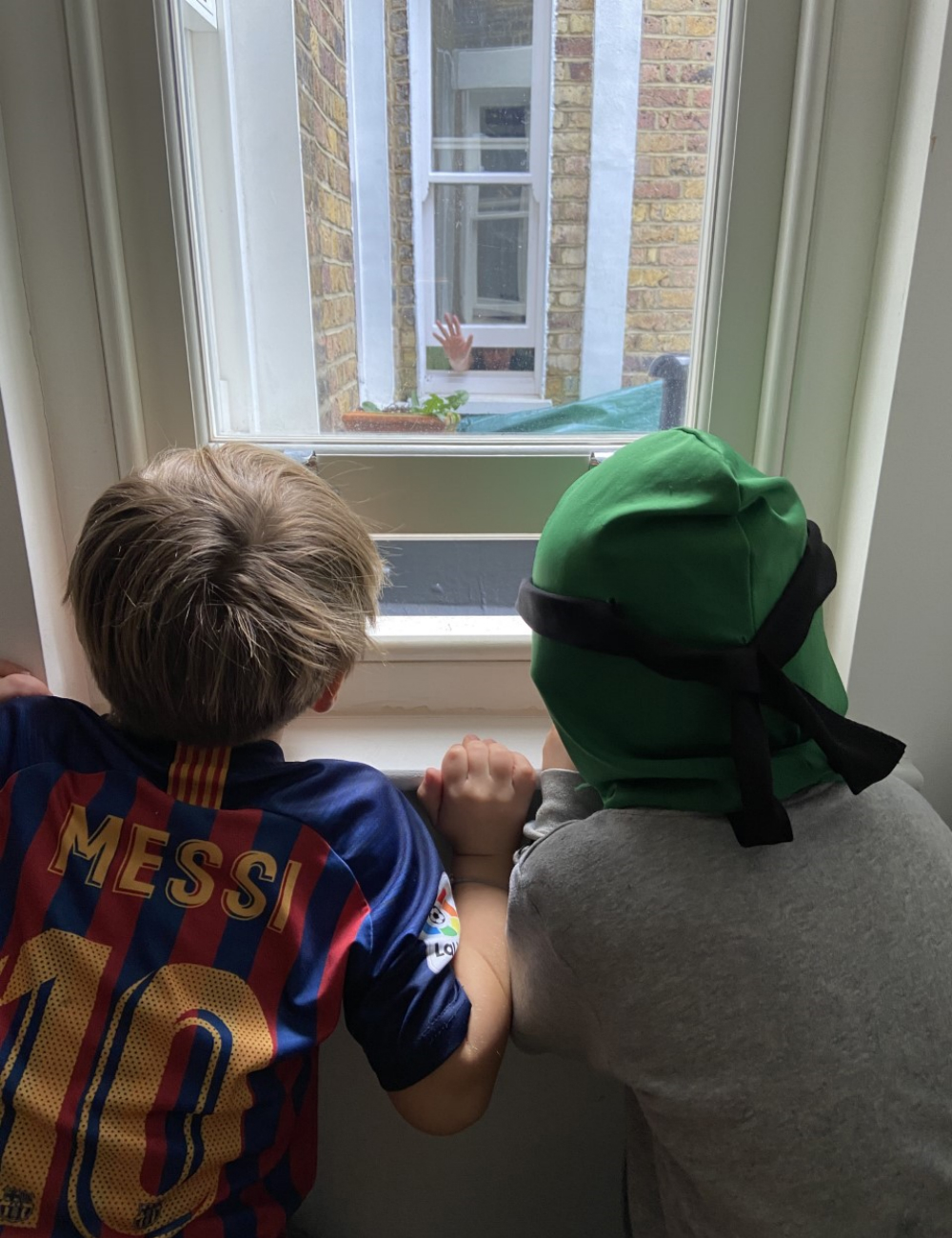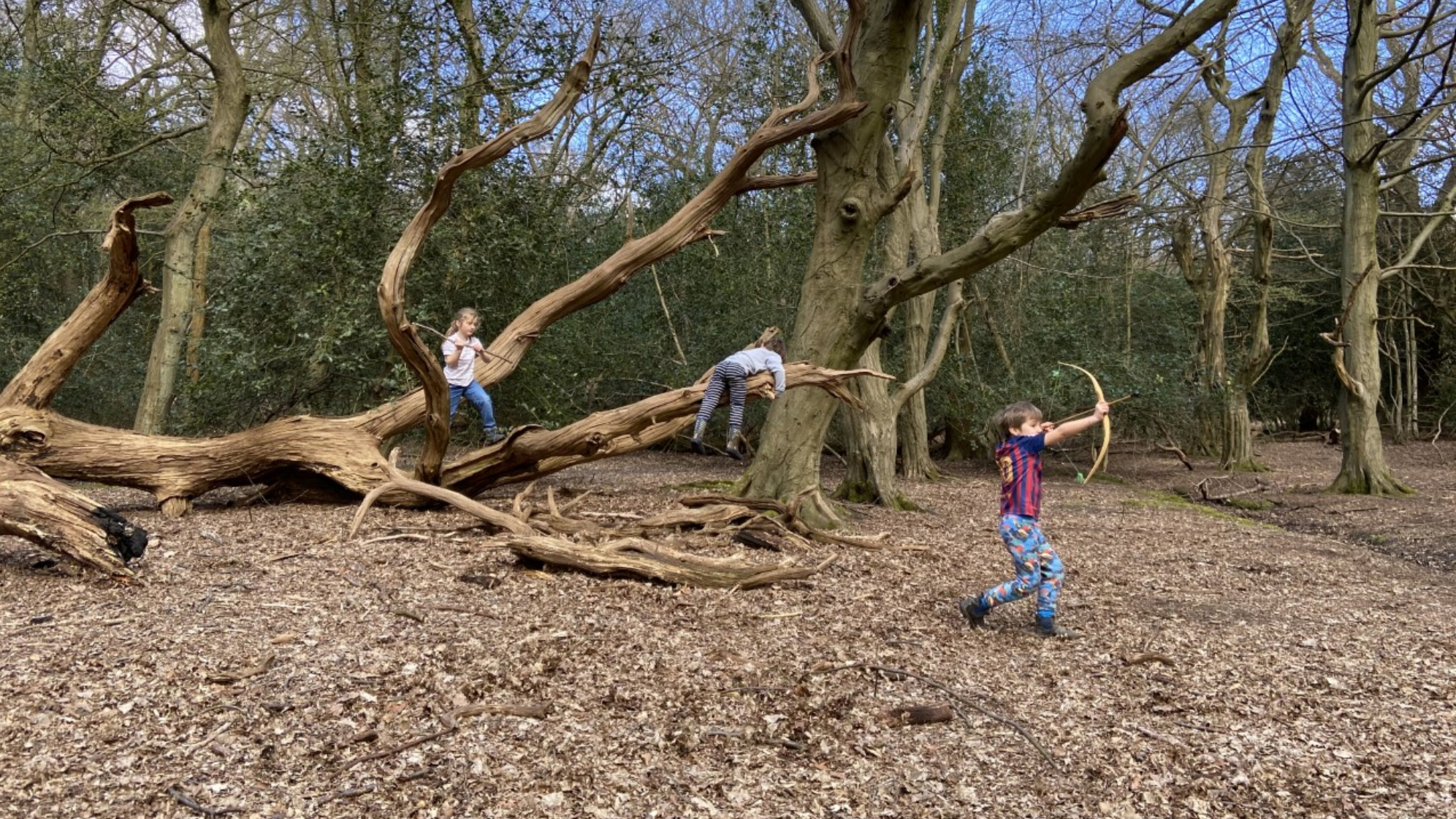'I'm working from home with three kids, a dog, a cat and my husband. What can possibly go wrong!'
Best-selling author Charlotte Philby is taking daily advice from her self-isolating schoolteacher mum, ‘Timetable activities, exhaust them with circuit training before breakfast. Don’t become an alcoholic...'


Celebrity news, beauty, fashion advice, and fascinating features, delivered straight to your inbox!
You are now subscribed
Your newsletter sign-up was successful
Best-selling author Charlotte Philby is taking daily advice from her self-isolating schoolteacher mum, ‘Timetable activities, exhaust them with circuit training before breakfast. Don’t become an alcoholic...'
According to that oft-quoted Yiddish phrase: ‘If you want to make God laugh, tell him your plans’.
Well, God, we had a plan, and I’m sorry I didn’t tell you about it at the time but I was a bit distracted what with the thousands of hours spent smugly researching affordable hotels, AirBnBs and house-swaps, alongside the small matter of renting out our home in London in order to fund our perfectly-plotted four-month family adventure of a lifetime.
It was out of character for me to be so organised, but we’d booked every last stop: driving between ten countries in Europe with my husband, Barney, and our three children, aged nine, six, and four – from the mountains of Northern Italy to the beaches of rural Denmark.
The idea was partly a last hurrah before the kids were too old to miss so much school, partly a bollocks-to-Brexit European tour, and partly research for a book I’ve been working on. Our friends and family would meet us at various points along the way, so we never felt isolated or short of help with the kids (because: imagine?!). All along, I was to write about the experience for Marie Claire, and intermittently pop back to the UK for various literary festivals to launch my second novel, A Double Life, whilst editing my third and taking notes for my fourth. It was so perfect a plan – so outrageously dreamy - that at one point, I turned to my husband and breathed: it almost feels too good to be true.

L.O.L.
Fast-forward to present day and we are immersed in a family-bonding experience of sorts. Except whereas in our previously-envisaged reality you might have found Barney and me teaching our kids choice words in French whilst making eyes at each other over a glass of something chilled on our rented canal-boat in Reims - the homeland of Champagne, today we are instead squabbling over the dregs of the booze cupboard while shouting conflicting instructions at our under-stimulated offspring, one of whom is being gently gyrated by our sexually aggressive border terrier, in rainy Hackney. But, que sera!
Celebrity news, beauty, fashion advice, and fascinating features, delivered straight to your inbox!
As my old boss once asserted before making half the office redundant: ‘It’s not a perfect world.’ And let’s be honest, our curtailed plan to ponce around Europe for a few months is hardly the gravest consequence of the global coronavirus lockdown. If I start to focus on those, at this point, then everything will implode so instead, I'm determined to focus on the one situation in front of us over which Barney and I have some semblance of control - that is providing emotional stability and some stimulation for our three very different but equally energetic children, whilst social distancing, maintaining two quite demanding careers, remembering to feed our dog and cat, and not ending up divorced.
I accept this challenge, ultimately because I have no choice. Besides, though I personally lack the basic authority to get my children to listen to a word I say, ever, I’m in the fortunate position of having a very effective primary school teacher for a mother. It would have been more fortunate if she wasn’t in self-isolation two miles up the road, but nonetheless, we have a phone… And so, on the morning of day one of no school - having come downstairs to find child one and child two have tied up child three using the string from our veg delivery box - I text my mum for tips on how to keep the kids distracted whilst I carry on with the job of promoting two novels and working on two more. Her reply is prompt: ‘Timetable activities and exhaust them at the beginning of the day. Circuit training before breakfast. Don’t become an alcoholic.’

Being a person whose only form of regular exercise is getting to the top of the stairs before forgetting what I went for and therefore having to make every trip twice, my brain briefly malfunctions at ‘circuit training’. When I’ve regained consciousness I start to consider that even more dreaded word: activities. Because when it comes to parenting there are planners, and there are those whose approach is more let-them-run-amuck-until-someone-screams. I am the latter, and unfortunately someone always screams.
Thankfully, we parents are all in the same boat. This is not homeschooling - a choice a parent makes and prepares for - this is an international emergency situation, and if any of us are to survive, we have to cut ourselves some slack. In the circumstances, the school has painstakingly pulled together booklets and guidance to help baffled parents assist their kids in the educational process for as long they're off (September has been mooted as the return date, and if this is God's plan then I am not amused).
After three minutes of studying my daughter’s Year 4 maths work, I have learnt that even basic arithmetic still brings me out in a rash. Teetering on the edge of panic, where I've already been teetering quite unsteadily for the past weeks, my mind flips back to my mum’s text. Exhaust them at the beginning of the day. And so, half an hour later we are in the car to Epping Forest where my husband suggests we play a giant game of Man Hunt.

For the un-initiated, Man Hunt is essentially a sinisterly-named game of group hide-and-seek. The opportunity to hide from my children is not something I usually shy away from, except that in my current heightened state of anxiety, I soon discover that a game that involves each of my kids running off into the woods in different directions and refusing to answer their names when called, is enough to reduce me to tears. And I’m not the only one. By the end of one round, child one is crying because I forced her to reveal herself by shouting 'BLOODY COME OUT NOW!' into the wind, at volume, child two is crying because he has fallen into a shallow bog, and child three is inconsolable because he wanted the game to be called Bears.
The good news is, by the time we get home, enough hours have passed that we can legitimately put on a film on my computer for the younger kids to watch whilst our daughter works through her online language class, and Barney and I respond to the seventy-nine emails that have amassed since we left for the forest. This is the exact moment at which it becomes apparent that there are five people stuck in this house for the foreseeable future, four of whom are hoping to work online for a substantial part of the day, whilst the youngest one entertains himself by stuffing every single teddy he owns into his clothes in a quest to be REALLY FAT - and there are only two computers. Not to worry!
I can write a novel on my phone, I tell myself whilst reaching for the dusty bottle of limencello my grandmother brought back from Venice circa 1993 with one hand, and a piece of the loo roll to wipe my weeping eyes with the other, before remembering we don't have any loo roll. No matter! The important thing is to stay positive, and the good news is we're one day down, and only five months and 29 days to go...
The Most Difficult Thing by Charlotte Philby (Borough Press) is out now. Her second novel, A Double Life, will be published in July 2020.
Nail WFH with these eight expert tips
Joshua Zerkel is a certified professional organiser and Head of Global Community at Asana. With fifteen years under his belt of helping people and businesses get more organized and increase their productivity, he's here to help you...
Be realistic with your to-do list Juggling remote work - and for many people, childcare - means you won’t be as productive. And that’s fine. Don’t try to overestimate what you’ll achieve and adjust your to-do list at the start of each day to actual hours you’ll be working so you don’t end up working much later than you planned.
Take control of your notifications: Opting out of notifications breaks the 'always-on' mindset that we constantly need to be available and reactive to others. To avoid continued disruption, I’d suggest turning off all but the most critical notifications - whether from a specific person or related to a particular project.
Take regular breaks to boost productivity: Research has shown that taking small breaks during the day actually improves productivity. Set aside specific time blocks for non-work activities like checking the news or scrolling through social feeds.
Set up email filters and rules: Most of us receive at least a few email promotions or newsletters a day that we should have opted out of long ago. To keep your email inbox streamlined, create filters to automatically sort through what you need to see now, versus what can wait until later.
Use “Do Not Disturb” mode: Say you’re on a tight deadline, or heading into an important meeting and you can’t afford to be distracted by anything. There are few substitutes for deep, uninterrupted focus time. In these situations, try turning on Do Not Disturb. Many mainstream productivity tools now include DND as a standard feature, including Asana.
Say goodbye to the 9-5 for now: With work and home life merging at the moment - working different hours may help you. Speak to your employer about things like starting earlier in order to finish earlier if this is going to help your productivity.
Change your surroundings: Sometimes, no matter what, your efforts to tune out digital distractions and concentrate on your work do not work - and you just can’t seem to focus - especially during this time! In these cases, try a change of scenery. Psychologists say that going outside - for your one permitted exercise a day - can help reset your brain and jumpstart creativity.
Follow a “less-is-more” approach on social media: Practicing good social media hygiene is one of the easiest ways to cut down on unwanted distractions. If an account is no longer providing valuable content, unfollow it. Conversely, if there are accounts that provide helpful links and information, follow them to ensure your content feeds are worthwhile. If you’re feeling extra bold, maybe even consider deleting accounts on platforms you don’t use any more.
